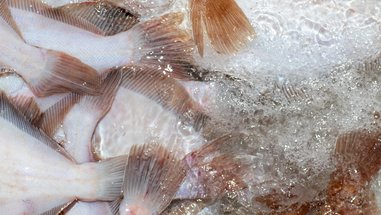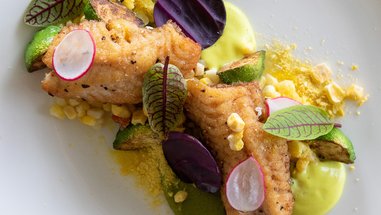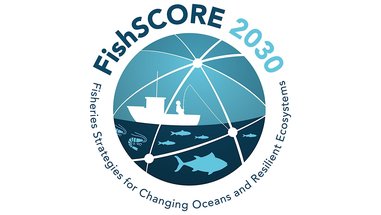Adapting Fisheries & Seafood
Ensuring marine ecosystems, fisheries and seafood systems in the Gulf of Maine and beyond thrive as they adapt to change.

What is the right amount of fish to harvest from the ocean?
How do we help people eat more, different types of seafood?
How can producing and harvesting food from the ocean help us address climate change?
How can we increase economic opportunities for seafood businesses throughout the supply chain?

Marine fisheries, aquaculture, and the seafood economy are important economic and cultural pillars in New England, generating over $1.5 billion in initial product sales—approximately 25% of the nation’s $6 billion in dockside value of seafood. Activities across the supply chain add considerable value through processing and marketing. These figures only capture a portion of the broader significance of fisheries, aquaculture, and seafood, which sustain livelihoods, drive regional economies, are a source of cultural identity, and provide nutritional and cultural value to communities across the Gulf of Maine and beyond.
Our research team integrates physical, ecological, and social sciences to build a deep understanding of changes that are reshaping how we think about sustainability. We explore how factors such as climate change, harvest, and management influence our fisheries and the seafood supply chain more broadly.
By partnering with harvesters, industry leaders, and community members, we then transform knowledge into action to support adaptation, resilience, and intergenerational opportunities across the region. Through our work with youth and educators, we give the next generation the science and data skills they need to manage the challenges and opportunities that come with adapting to a changing ecosystem.
Ensuring marine ecosystems, fisheries and seafood systems in the Gulf of Maine and beyond thrive as they adapt to change.
We work with industry leaders across the supply chain to build market demand and empower consumers to find and buy Gulf of Maine seafood. We …
This program is building a global network of scientists, fishing sector members, practitioners, and policy experts that aims to co-develop approaches to sustain marine fisheries, …
Learn how we partner with chefs, small-business owners, and other food-system leaders by exploring our 2024 Gulf of Maine Tastemakers Impact Report.
ExploreOur sustainable seafood team created a local seafood guide translated in five different languages to serve some of vibrant immigrant communities here in Maine.
Tidings
Explore the map of regional restaurants and retailers that are part of our Gulf of Maine Tastemakers program and are committed to sourcing at least …
Perspectives
In this Gulf of Maine, Explained video, GMRI Sustainable Seafood Director Kyle Foley highlights the abundance of delicious seafood from the Gulf of Maine, outlines …
Gulf of Maine, Explained
Customers who have immigrated to Maine often don't 'relate' to the fresh seafood they see in stores, a Hannaford merchandiser said. The new guide may …
Press Clips


